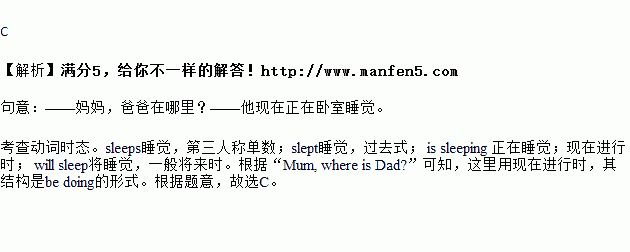题目内容
— Mum, where is Dad?
—He________in the bedroom now.
A.sleeps B.slept C.is sleeping D.will sleep
Hairstyle is thought to be a personal style choice.
However, some Chinese students are required by their school to have unified (统—的) haircuts, with short hair for male students and shoulder-length hair for female students. Some students don't like such hairstyles and have broken the rules in school.
A complaint letter by a middle school student in Fuzhou, Fujian province as well as the response of the local education bureau (教育局) to the letter has caught public attention. The letter has sparked (引发) public discussion on whether schools should control how students wear their hair.
In the letter, which was published recently on Fuzhou's 12345 website, the student wrote, “I think the so-called 'good purposes' of the school are wrong and I highly question whether this kind requirement really helps students to develop good habits and show good appearances," the student said.
The school told students that it is easy for teenage male students to pay more attention to beautiful female students, so the school wants girls to have simple appearances and develop their talents, the letter said.
"I think these words are a complete lie. How can you expect someone to have a colourful future if he or she does not know how to look attractive? Why does the school need to make all the teenage boys pay no attention to girls? Doesn't the school need more sexual (性别的) education?
"Teenagers should be colourful and different. Isn't it boring when people look back on their teenage years and can only remember ugly haircuts and same uniforms? Why can't the school give students a choice to be themselves? "
The Fuzhou education bureau wrote back to the student and said it proves that the writer is a good student with his own thoughts, courage and truth-seeking spirit. The schools ask students to have unified haircuts and wear uniforms because it is easy for teenagers to pay much attention to their appearances and little attention to their studies, the bureau said. Collectivism (集体主义) is very important for the country's development. Although the city has required students to have unified haircuts, schools can set different hairstyle standards that allow students to show their personal styles.
Debate (讨论) on hairstyle | |
Student | The purposes of the school are 1. of the students’ wills. It's 2. for students to follow school’s requirement to develop good habits and show good appearances. Students’ personal styles are paid little attention to, 3. is the sexual education. |
Local education bureau | The local education bureau wrote back and 4. the student's good characters. It's necessary to develop collectivism by having unified haircuts and wearing uniforms. Besides, school rules can be 5. by setting different standards to meet students' reasonable needs. |


